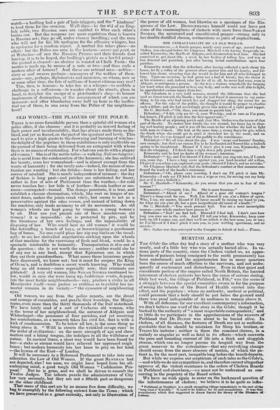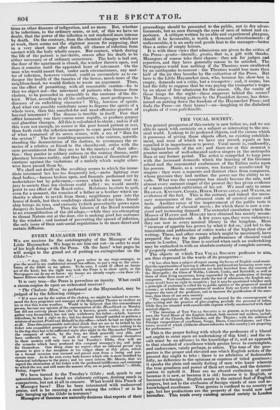BURYING ALIVE.
THE Globe the other day had a story of a mother who was very nearly, and of a little boy who was actually buried alive. In va- rious parts of the country, since the Cholera visited us, an appre- hension of patients being consigned to the earth prematurely has- been entertained; and the apprehension has in many quarters. been the source of much affliction to the survivors, and not unfre- quently of excitement and disturbance. Even in that quiet and : considerate portion of the empire called North Britain, the hurried interment of cholera patients has been the cause of serious rioting. Only last week, the village of Pathhead, in Fife,* was the scene of a struggle between the special constables sworn in for the purpose of seeing the behests of the Board of Health carried into due- effect, and the populace ; whom no authority, medical or political,. could persuade that a body should be put below the ground until there was proof indisputable of its unfitness to remain above it.
With all deference for our excellent contemporary's information, we don't believe one word of the story in the Globe, though it be- backed by the authority of" a most respectable correspondent ;" and as little do we participate in the apprehensions of the weavers or Pathhead that Dr. DANDY was about to be buried alive. la cholera, of all diseases, the features of Death are not so undistin- guishable that he should be mistaken for Sleep his brother, or Trance his imitator; neither is there the remotest chance, in mi malady so singular as well as fatal in its effects—which converts the pure and bounding current of life into a thick and sluggish • stream, which can no longer pursue its languid way from the great reservoir to the extremities—that any revivifying change should ensue from the mere absence of motion, of which the pa- tient is, for the most part, incapable long before the breathdeparts.
But while we express our scepticism of such tales as the Globe's, —and while we do not sympathize in, and therefore cannot altogether approve of, the violent resistance to the orders of Cholera Boards in Pathhead and elsewhere,—we must not be understood as con- curring in the propriety of the Board orders.
We have no wish again to enter on the hackneyed question of the infectiousness of cholera; we believe it to be quite as Wee:-
• Patbhead, or Dunikier, is a small straggling village immediately to the east of the "hug Mon o' Kirraldy." It used to be famous for its nail manufactory. It was that manufactory which first suggested to ADAK Sacra his theory WO& Dilemma Labour. tious as other diseases of indigestion, and no more. But, whether it be infectious, in the ordinary sense, or not, of this we have no doubt, that the power of the infection is not rendered more intense by death. On the contrary, from the chemical changes which are at work, there seems not the slightest reason for supposing, that in a very short time after death, all chance of infection from contact with the body wholly ceases. But contact, which during the life of the patient is inevitable, ceases after his death to be either necessary or of ordinary occurrence. The body is laid out, the door of the apartment is closed, the window thrown open, and thus it remains until the appointed hour of interment. On the man who would assert that, under such circumstances, any mat- ter of infection, however virulent, could so accumulate as to en- danger the health of the inmates of the house, much more of the neighbourhood, we would disdain to waste an argument. Then, see the effect of permitting, with all reasonable caution—for to that we object, not—the interment of patients who decease from cholera, to be proceeded in agreeably to the customs of the dis- trict. What, according to all the authorities, most predisposes to diseases of an enfeebling character ? Why, lowness of spirits. And what can possibly contribute more to depress the spirits of a whole town, than this uncalled-for and most offensive practice of hurried interment ? The disease is terrible in itself. Few that :afflict humanity run their course more rapidly, or produce greater and ghastlier changes. All this is calculated to alarm ; and as if all this were not enough, no sooner is the poor tossed patient at rest, than forth rush the infection-mongers to scare poor humanity out of what remained of its seven senses, with a cry of " Run for the sexton !" The few trembling mourners who venture, notwith- standing the denunciation of the doctors, to accompany the re- -mains of a relative or friend to the churchyard, retire with the sure presentiment that they are to be the martyrs of their affec- tion : they ponder in solitary sadness on the coming disease, until phantasy becomes reality, and thus fall victims of theoretical pre- cautions against the visitations of a malady which might other- wise have passed them by. We shall not dwell on the revolting scenes to which the imme- diate interment law has too frequently led,—mobs fighting over dead bodied,—houses broken open, and funerals performed not by undertakers but by policemen,—scenes which do more real in- jury to society than ten cholems could inflict : we would merely pOint to one effect of• the Board rules. Relations hesitate to quit, even for a moment, the remains of a father or a brother which au- thority is about to ravish from them; neighbours pour into the house of death, lest their condolings should be all too late; friend- ship brings its tens, and curiosity (which proverbially grows upon danger) its hundreds. Thus the labours of the Board terminate in an exemplification of the old adage,—while they are attempting to thrust Nature Out at the door, she is making good her entrance by the window; and instead of preventing the spread of infection, the only issue of their anti-social regulations is its more direct and certain diffusion.



























 Previous page
Previous page